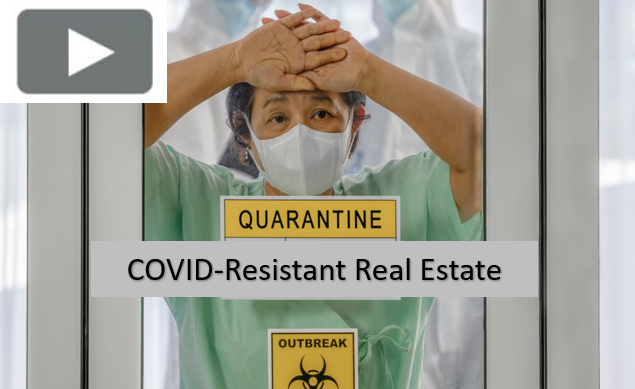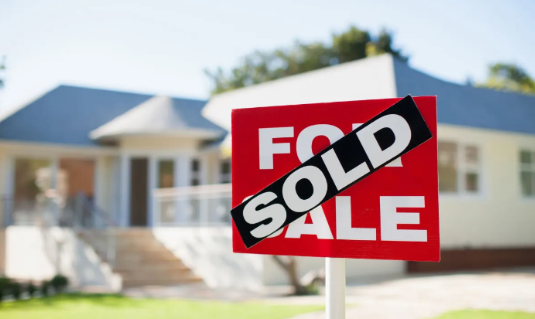
COVID-Resistant Real Estate
THIS BLOG IS A TRANSCRIPT OF THE ABOVE VIDEO. IT IS INTENDED TO BE WATCHED RATHER THAN READ.
After months of closely watching national real estate data in 2020, it is clear that some asset classes exhibit greater immunity to COVID-19 than others.
Some of these property types will endure, during and after the pandemic. Others may be negatively impacted for years.
STRONG IMMUNITY
Let’s start with three of the strongest asset classes:
• CLASS-A MULTIFAMILY
During the pandemic, institutionally-operated apartment communities, particularly in suburban markets, have proven what we always knew: multifamily residents consistently pay their rent because shelter is a fundamental human need. Furthermore, Class-A apartments typically house Americans who have steady employment and live within their means. And managers of these properties are skilled at both screening for qualified renters and maximizing retention. While many mom-and-pop rental owners struggle with high default rates and collections issues, professionally-operated communities nationwide are better equipped to survive or even thrive under current conditions.
• SELF-STORAGE
In addition to keeping a roof over their heads, Americans also prioritize keeping a roof over their stuff. Storage units are a relatively small cost for most renters, while the penalty for non-payment—forfeiting their contents—is very high. With short-term rental periods, storage rents can be increased regularly, while operating costs, as a percentage of revenue, are much lower than multifamily. We have seen some isolated areas of overbuilding, but generally the supply-demand curve for self-storage centers continues to favor owners. And there are no eviction moratoriums for failing to pay rent on your Christmas decorations.
• INDEPENDENT AND ASSISTED-LIVING SENIOR COMMUNITIES
It is important to recognize the difference between nursing homes or long-term-care facilities and assisted-living communities. The former properties provide medical services to patients, while the latter offer limited assistance to residents. This difference between a medical facility and a residential community is critical. Nursing homes received considerable negative press over the last year, as many such facilities became hot spots for COVID hospitalizations and even deaths. Conversely, residential communities that cater to independent seniors, or those who need limited assistance, continue to attract retired Baby Boomers, many of whom no longer want to be bothered with the hassles of homeownership. The demographic trends driving occupancy in assisted-living communities will continue long after the pandemic is under control.
Other strong asset classes include net-lease distribution centers, net-lease necessity retail and necessity healthcare properties.
ASSET TYPES WITH WEAK COVID RESISTANCE
On the other end of the spectrum, the coronavirus has made some types of real estate quite sick, ranging from mild illnesses to outright fatalities. These include:
• Hotels
• Student housing
• Full-service restaurants
• Indoor malls
• Boutique retail
• Urban office
• Lower-income housing
Sadly, not all of these real estate types are inherently risky, but they have borne the brunt of broad and sometimes arbitrary government responses to the pandemic.
If you are interested in exchanging your rental property for something with stronger resistance to the COVID-19, please give 1031 Capital Solutions a call today. Thank you.
Statements concerning financial market trends are based on current market conditions, which will fluctuate. Examples provided may fluctuate and are not guaranteed.
This information is for educational purposes only and does not constitute direct investment advice or a direct offer to buy or sell an investment, and is not to be interpreted as tax or legal advice. Please speak with your own tax and legal advisors for advice/guidance regarding your particular situation. Because investor situations and objectives vary, this information is not intended to indicate suitability for any particular investor. The views of this material are those solely of the author and do not necessarily represent the views of their affiliates.
Investing in real estate and 1031 exchange replacement properties may involve significant risks. These risks include, but are not limited to, lack of liquidity, limited transferability, conflicts of interest, loss of entire investment principal, declining market values, tenant vacancies, and real estate fluctuations based upon a number of factors, which may include changes in interest rates, laws, operating expenses, insurance costs and tenant turnover. Investors should also understand all fees associated with a particular investment and how those fees could affect the overall performance of the investment.
Securities offered through Concorde Investment Services, LLC (CIS), member FINRA/SIPC. Advisory services offered through Concorde Asset Management, LLC (CAM), an SEC registered investment adviser. Insurance products offered through Concorde Insurance Agency, Inc. (CIA). 1031 Capital Solutions is independent of CIS, CAM and CIA.
continue reading
Related Posts
Changes are Happening Quickly – Don’t be Left Behind Managing […]
The Burdens of Managing Rental Property in Retirement Retirement should […]
Trusts, Partnerships and 1031 Exchanges One crucial aspect of real […]











